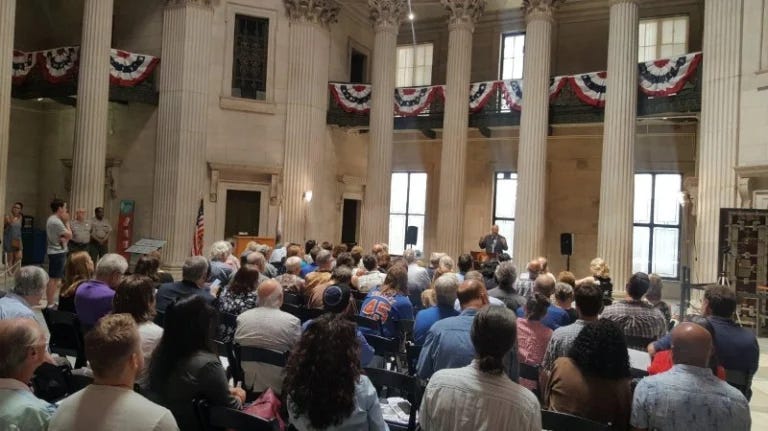The U.S. Constitution: Fintech 1.0
My new talk on Alexander Hamilton’s systems and the transformative power of financial technology
I don’t usually send you updates on my various related ventures—you’re already doing plenty to support my efforts—but I’m making an exception with this one. It’s a pitch for a new talk I’ve worked up. The talk connects my ongoing explorations of Hamilton’s 18th-century financial innovations to 21st-century financial innovations by framing the Hamilton system, and in a sense the U.S. Constitution itself, as a financial technology—what today we call fintech. While somewhat counterintuitive, it’s a fair framing, I think—but also a fun one—and I’ve had positive gut responses from people in the finance industry. (Also from Marxists. But that’s a story for another time.)
I’ve been giving paid talks to groups and sparking lively discussions for a long time now; for this one, I’m hoping to get booked by some of the many fintech conferences now ubiquitous around the country and around the world. If you have connections in that universe, I’d be delighted to get hooked up. In any event, here’s the brochure:
The U.S. Constitution: Fintech 1.0
Alexander Hamilton’s Systems and the Transformative Power of Financial Technology
a new talk by historian William Hogeland
Alexander Hamilton’s finance system’s crucial importance to the U.S. founding is widely acknowledged, both within and outside the finance industry—yet some writers on that history continue to put what Hamilton saw as the cart before what he saw as the horse. The familiar narrative has it that a national financial system flowed, naturally enough, out of the creation of the national government itself, which occurred at the famous Constitutional Convention in Philadelphia in 1787. And at first glance, the misconception might seem to make plenty of sense.
But as William Hogeland argues in this lively new talk, that’s just the opposite of what happened. National-scale finance drove the creation of the national government—not the other way round. In that process, Hamilton carefully designed a new technology for connecting dynamic national aims with dynamic interstate money.
An expert on finance in the early republic, Hogeland shows how a desire by bankers and investors to create a consolidated financial system, beginning in the period preceding the Constitutional Convention, fostered not only the drive toward a national government but also certain long-overlooked aspects of that new government’s structure, critical to Hamilton’s efforts. While the subject is rarely taught this way, what emerged from the convention in Philadelphia should really be seen as a set of specs for an early, highly innovative financial technology: the U.S. Constitution, Fintech 1.0. At its most elemental level, our new national government was dedicated to, even dependent on, what was then cutting-edge fintech.
“Technology” is an old word. It’s taken on such modern and even digital connotations, however, that applying it to the Constitution and Hamilton’s system might seem anachronistic. The usage here is precise. In a fun and compelling way, Hogeland shows how Hamilton drew on an existing science of public finance to design a set of financial tools dedicated to bringing about a fundamental transformation specific to the United States. Once that design was worked into the Constitution’s legal framework, Hamilton used the toolset to bring about the first iteration of a dynamic American economy that hadn’t existed before him—an economy that would ultimately have powerful global effects. The story brings to life the unexpectedly freewheeling world of founding-era finance theory and action; the genius of the risk-seeking pioneer of American banking Robert Morris, Hamilton’s mentor, little-remembered today; and Hamilton's systems’ transformative effects on the country. Hogeland’s new reading of our founding national history places financial technology at the center of the American creation.
You can get a sense of William Hogeland’s improvisatory yet focused speaking style in this brief clip from a very different yet related talk. To pursue a booking, contact Eric Lupfer at United Talent Agency: eric.lupfer@unitedtalent.com.
_________________
William Hogeland is a compelling and experienced speaker who has given well-received talks, sparking enthusiastic q&a, for such varied audiences and organizations as the Museum of American Finance History, Citrin Cooperman Accountants and Advisors, the National Alcohol Beverage Control Association (morning keynote, Aspen), the Kansas City Public Library, the World Affairs Council of Dallas, the Museum of American History, and many others. He is the author of The Whiskey Rebellion (Simon and Schuster), Founding Finance (University of Texas Press), The Hamilton Scheme (Farrar, Straus and Giroux, forthcoming), and other U.S. history books for general readers. He has served as a history consultant for Comedy Central’s “The Daily Show” and appeared on PBS TV “History Detectives,” CBS TV “Good Morning, America,” and C-SPAN “Book TV,” as well as on many podcasts and radio shows. More here.




A Personal note:
I went to hear Dame Linda Colley speak about her latest oeuvre "The Gun, the Ship, and the Pen: Warfare, Constitutions, and the Making of the Modern World" at The Bedford Playhouse in Westchester County. Felt like an adolescent going to hear The Beatles in the 1960's, in other words, touching the life of an historian whose "BRITONS" had delighted me in graduate school some years ago. The Playhouse is giving space to the John Jay Lecture Series while the Jay Homestead undergoes renovations for the next couple of years. Lecture series chair: Melissa Vail.
Personal note #2. Just read online a critique that you wrote about Nussbaum's idealization of Hamilton which causes me to wonder if these revisions of history and idealizations of the imagination are the reason that the Boston Tea Party is not explained in the context of The British Tea Company. It's a simple form of idolatry, idealizing this nation's history to make its people willing to pay taxes and fight in foreign wars, similar to one of Colley's themes.
Why there is a Court of Chancery in tiny Delaware, and "What's the Matter with Delaware?" explained by Hal Weitzman.
https://stitcher.simplecastaudio.com/2be48404-a43c-4fa8-a32c-760a3216272e/episodes/9893bd06-cd29-44a1-a64d-9f69b52d003d/audio/128/default.mp3/default.mp3_ywr3ahjkcgo_5ab95329fe02d5e879808cc0cd95b77c_50601119.mp3?awCollectionId=2be48404-a43c-4fa8-a32c-760a3216272e&awEpisodeId=9893bd06-cd29-44a1-a64d-9f69b52d003d&nocache&x-ais-classified=streaming&hash_redirect=1&x-total-bytes=50601119&listeningSessionID=0CD_382_120__794c5196f122ae886b88ad51ba45fd3d9d3a4160